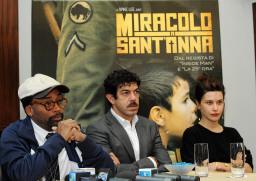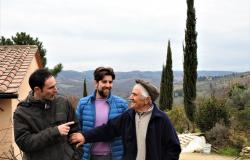US director Spike Lee has fanned the flames of controversy again in Italy, suggesting survivors of a Nazi massacre in Italy were unlikely to remember the incident accurately.
Speaking in a TV interview to be broadcast Wednesday, Lee defended his new film, which has generated heated debate in Italy for its portrayal of the 1944 atrocity.
''Anyone who survived that massacre would only have been eight or nine at the time,'' he said. ''I sincerely doubt that a child of that age would remember precisely everything that happened on August 12, 1944''.
The movie tells the story of four African-American soldiers in Italy in 1944 but also explores an infamous Nazi slaughter in which 560 villagers, including 116 children, were killed.
Miracle At St. Anna was released in the US last month to unenthusiastic reviews, which applauded the subject matter but said the film was overly long and disconnected.
The film has created a stir in Italy, where the massacre is a sensitive national issue, for suggesting that a partisan betrayed the coastal village of Sant'Anna di Stazzema to the Nazis.
Survivors have also expressed anger that the award-winning director failed to meet with them to discuss their memories of the event.
''I and the other survivors were available to work with the director but it did not happen,'' said 76-year-old Enrico Pieri, who was twelve at the time and escaped only because he was hidden under a mass of bodies.
However, Lee says he spent considerable time in talks with survivors and also insists there are two sides to every story.
''There is one thing people refuse to accept and that is there not just a single version of what happened that day,'' he said during the interview, which will be screened on Rai 2 channel late Wednesday evening.
''The only thing that is certain is that 560 people died - or rather, were assassinated''.
Critics in Italy have also pointed to a war crimes trial on the incident, which concluded last November with the country's supreme court upholding the convictions of three former SS officers, now in their 80s and living in Germany.
They say Lee ignored the mass of new information that emerged from the long-running proceedings in the Tuscan city of La Spezia.
But asked about the trial by interviewer Giovanni Minoli, the US director rejected the notion it had revealed an ironclad truth about what happened that day.
He also suggested the furious response to the movie was the sign of a deeper problem.
''This affair simply shows that Italy must still examine its conscience with regard to its own history and in particular to World War II,'' he said.
''We made a film, therefore a product of fiction, based on a few historic episodes, and an introduction at the start of the film points this out.
''For me, all these polemics show just one thing: that the wounds Italy received after the civil war, after the second world war, are still open''.
Despite the criticism from survivors and Italy's National Association of Partisans, the village council where the massacre occurred unanimously voted to award the US filmmaker honorary citizenship.
Stazzema Mayor Michele Silicani admitted Lee had used ''artistic licence'' in his interpretation but said the movie had brought to light ''what happened, as well as values such as the sacrifice and resistance of local people''.
''This film pays tribute to partisan values,'' he added. ''It's true that it depicts a partisan who betrayed civilians but above all, it is the tale of those partisans who fought to the death to defend civilians''.










